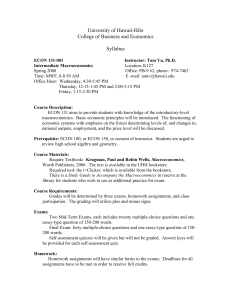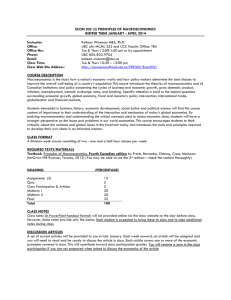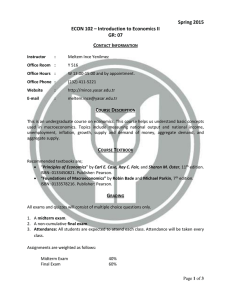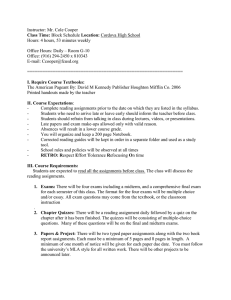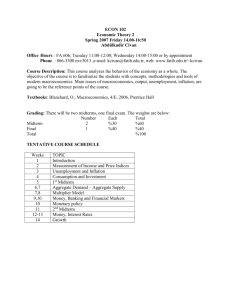sect. 1 w/Dr. Zhou - California State University, Sacramento
advertisement
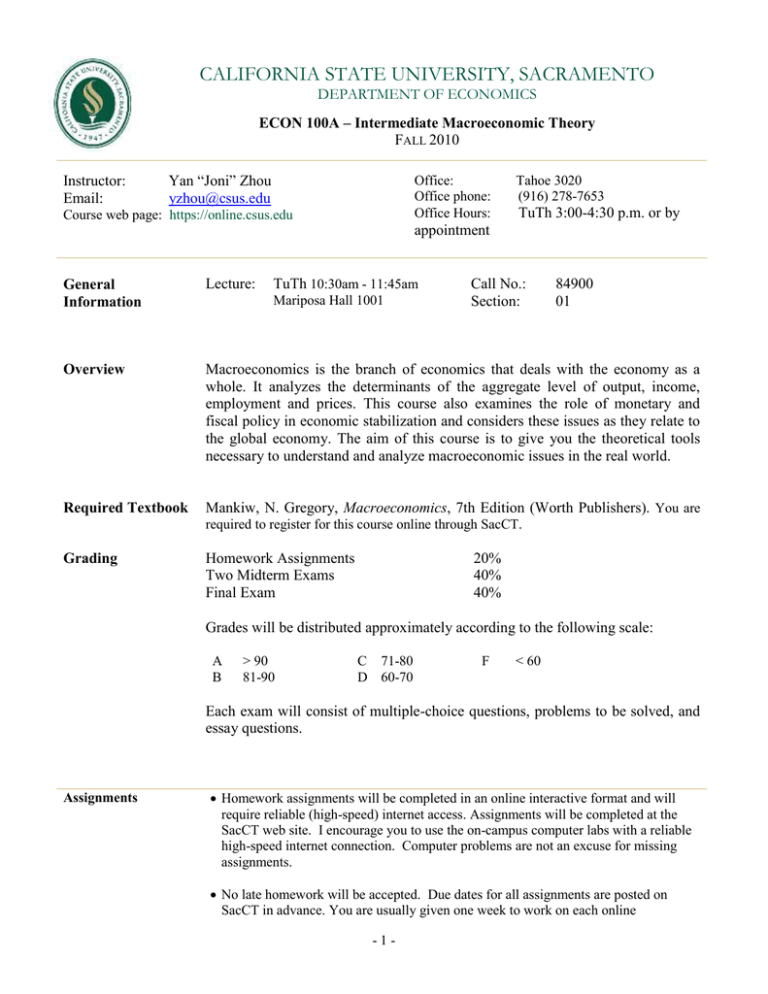
CALIFORNIA STATE UNIVERSITY, SACRAMENTO DEPARTMENT OF ECONOMICS ECON 100A – Intermediate Macroeconomic Theory FALL 2010 Instructor: Email: Yan “Joni” Zhou yzhou@csus.edu Office: Office phone: Office Hours: Course web page: https://online.csus.edu Tahoe 3020 (916) 278-7653 TuTh 3:00-4:30 p.m. or by appointment General Information Lecture: TuTh 10:30am - 11:45am Overview Macroeconomics is the branch of economics that deals with the economy as a whole. It analyzes the determinants of the aggregate level of output, income, employment and prices. This course also examines the role of monetary and fiscal policy in economic stabilization and considers these issues as they relate to the global economy. The aim of this course is to give you the theoretical tools necessary to understand and analyze macroeconomic issues in the real world. Required Textbook Mankiw, N. Gregory, Macroeconomics, 7th Edition (Worth Publishers). You are Mariposa Hall 1001 Call No.: Section: 84900 01 required to register for this course online through SacCT. Grading Homework Assignments Two Midterm Exams Final Exam 20% 40% 40% Grades will be distributed approximately according to the following scale: A B > 90 81-90 C 71-80 D 60-70 F < 60 Each exam will consist of multiple-choice questions, problems to be solved, and essay questions. Assignments Homework assignments will be completed in an online interactive format and will require reliable (high-speed) internet access. Assignments will be completed at the SacCT web site. I encourage you to use the on-campus computer labs with a reliable high-speed internet connection. Computer problems are not an excuse for missing assignments. No late homework will be accepted. Due dates for all assignments are posted on SacCT in advance. You are usually given one week to work on each online -1- assignment. It is not possible to extend time for assignments after the due date. Give yourself ample time to complete the assignments. These assignments are challenging and important both for your homework grade and your performance in the class. I encourage you to spend time working through them carefully and to seek out help from me, a classmate, or an economics tutor when you encounter problems. Answer keys for all material will be available online immediately after the due date and time. Please be sure to review your problem sets before exams. You will also be given in-class exercises, which are important for improving your performance in the class. These exercises are not graded and are discussed right after you complete them in class. You are encouraged to attend the class regularly and work on those exercises. Free peer tutoring for this class is available in the Department of Economics. Tutoring hours are posted in the department office during the first week of classes. Policies 1. Academic honesty is expected. No cheating on homework or exams. I encourage you to work together on problem sets and to help each other in studying, however, work submitted for a grade must be that of the individual student. You will receive a mark of zero on any work (including exams) where cheating occurs. 2. You are responsible for bringing a scantron form (#882-E) on the day of exams. Exams will be closed book and given in class. 3. There will be no makeup examinations. Exam dates are given in the course outline below and are on posted online. All exam dates are fixed, if you cannot take exams on these dates, please do not enroll in this class. 4. Attendance is highly recommended. If you miss a class, be sure to check with your fellow classmates, and the course web page to see what material you missed. 5. Come to class on time; you will not be given extra time if you are late for an exam. 6. If you decide to withdraw from this class, please make sure you do so with the registrar. If you withdraw without permission, you will be assigned a failing grade. 7. Keep cell phones shut off during class. During exams, you may not use your cell phone as a calculator. You must bring a calculator w/o programming capabilities. 8. Please do not browse the internet, look at materials unrelated to the course, play computer games, or chat online. 9. If you have a learning disability or a physical disability that requires accommodation, please let me know as soon as possible. All needs that have been verified through the Services to Students with Disabilities (Lassen Hall) will be accommodated. -2- Tentative Course Outline Week 1 Dates Topic Reading Aug. 30 – Sep. 3 1. Syllabus 2. The Science of Macroeconomics 3. The Data of Macroeconomics - GDP Chapters 1 Chapter 2 Week 2 Sep. 6 – 10 4. The Data of Macroeconomics - Measuring the Cost of Living 5. The Data of Macroeconomics - Measuring Joblessness Chapter 2 Week 3 Sep. 13 – 17 6. National Income - the Goods and Services Market Chapter 3 Week 4 Sep. 20 – 24 7. National Income - the Labor Market and the Natural Rate of Unemployment Chapter 6 Week 5 Sep. 27 – Oct.1 8. Money and Inflation Chapter 4 Week 6 Oct. 4 – 8 Review for Midterm Exam #1 Midterm Exam #1 – (Thursday, Oct 7) Week 7 Oct.11 – 15 9. Economic Growth I: An Introduction to Solow Growth Theory 10. Economic Growth I: Solow Growth Theory with Population Growth Chapter 7, p192-210 11. Economic Growth II: Solow Growth Theory with Technological Progress 12. Beyond Solow: Endogenous Growth Theory Chapter 8, p222-236 Chapter 9 Week 8 Oct. 18 – 22 Chapter 7, p211-217 Chapter 8, p238-243 Week 9 Oct. 25 – 29 13. Introduction to Economic Fluctuations Week 10 Nov. 1 – 5 Review for Midterm Exam #2 Midterm Exam #2 – (Thursday, November 4) Week 11 Nov. 8 – 12 14. Aggregate Demand I Campus closed on Nov. 11. Chapter 10 Week 12 Nov. 15 – 19 15. Aggregate Demand II Chapter 11 -3- Week 13 Nov. 22 – 26 Week 14 16. Aggregate Supply Campus closed on Nov. 25. Chapter 13 Nov. 29 – Dec 3 17. A Dynamic Model of Aggregate Demand and Aggregate Supply Chapter 14 Week 15 Dec 6 – 10 18. Government Debt and Budget Deficits Chapter 16 Week 16 Dec 13 – 17 Final Exam (comprehensive) Thursday, Dec 16, 10:15a.m.-12:15 p.m. -4-


